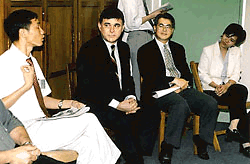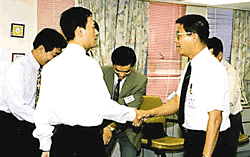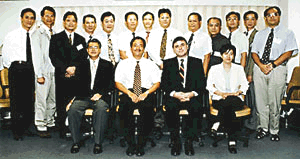



















 Wanchai station sergeant discusses conflict management workshop with its originators | SCENARIO: A long
line of people are waiting at the post office to purchase a set
of newly issued stamps. Suddenly an angry citizen approaches you complaining that he
has been waiting in line for six hours and somebody has jumped into the line ahead of
him. He demands that you kick the queue-jumper out. Meanwhile, the person accused
of jumping the queue responds by saying that he was taking the place in line of his wife
who had been waiting there all night - and that he has no intention of leaving his spot.
¡@How would you handle the situation? |
|
¡@SCENARIO: Outside the headquarters of the Housing Authority, a group of squatter residents want to submit letters of complaint about poor living conditions and about shortening their waiting time for public housing. You have received orders to maintain public order and prevent the demonstrators from entering the headquarters. They get angry when you tell them they cannot enter the building and start pushing towards the entrance. ¡@How would you handle this situation? What would you do to calm things down? ¡@These scenarios were just two of many presented to Wanchai NCOs (non-commissioned officers) during a conflict management workshop organised by Wanchai District and the Force's Psychological Services Group - and one five full-day courses which have attracted the participation of 70 NCOs, both sergeants and station sergeants from the District. ¡@The series of sessions follow those given to police constables in Wanchai last year - both the idea of Wanchai Divisional Commander Eddie Ko Chi-ming. At his request, the Police Psychological Group came up with a tailor-made training course for over 200 police constables from the Uniform Branch and Crime Streams in 1996. ¡@This year, the sphere for training was extended to the NCO level in Wanchai District. | |
|
¡@"This is a new attempt for us to apply psychological theories to day-to-day police work,"
said Senior Police Clinical Psychologist Eddie Li Kam-wah. "Another important aspect is to
help members of the Force create healthy working atmospheres lessening pressure and enabling
them to perform their jobs more effectively and efficiently.
¡@"In fact, most police work is handling people. So apart from providing a chance for NCOs to share their feelings, these workshops combine theories of behavioural science with actual policing experience gained from routine work." |
 Thinking before reacting - NCOs managing a conflict scenario in Wanchai District |
|
¡@Echoing Mr Li's remarks, Wanchai District Commander Anthony McLoughlin said: "The improvement of interpersonal relationships between police and public can minimise unnecessary conflict and ultimately raise our service quality - which is the main objective of the workshop. ¡@"Wanchai is a unique district. It is made up of residential and commercial areas with large crowds that include both locals and foreign visitors. To reduce the potential for conflict, it is important to help police officers understand how the public feels. ¡@"The course doesn't simply employ academic psychology to teach our staff a lesson. It's about human nature - and deals with mutual respect, empathy and the like. The psychologists use a layman's approach to help our staff learn how to handle interpersonal conflicts." ¡@Another key player in the project is clinical psychologist trainee Wong Pui-ying from the University of Hong Kong who offered tremendous assistance in the design and the actual running of this conflict management programme. ¡@"She is the mastermind and engineer behind the project and has created new content aimed specifically at the needs of those in the NCO rank," Mr Li said. ¡@Although the courses last year for police constables shared such common material with that of the NCO course as the nature, solution and management of conflict, this time the sessions concentrated on teaching NCOs (who play an important role as supervisors of routine work) how to give directives to their subordinates on handling conflict in a calm, firm and well-considered manner - one of the keys to successful policing. | |
 Ko, Li, McLoughlin and Wong with participants of conflict management workshop |
¡@And nowadays, according to Senior Psychologist Li: "The job of a police officer has become more and more difficult. The pressure they face is higher and more intense than in the past. The social trend has changed. The demand from the public is increasing. Better interpersonal skills to eliminate the potential element of conflict between police and public has never been more important." |

![]()
